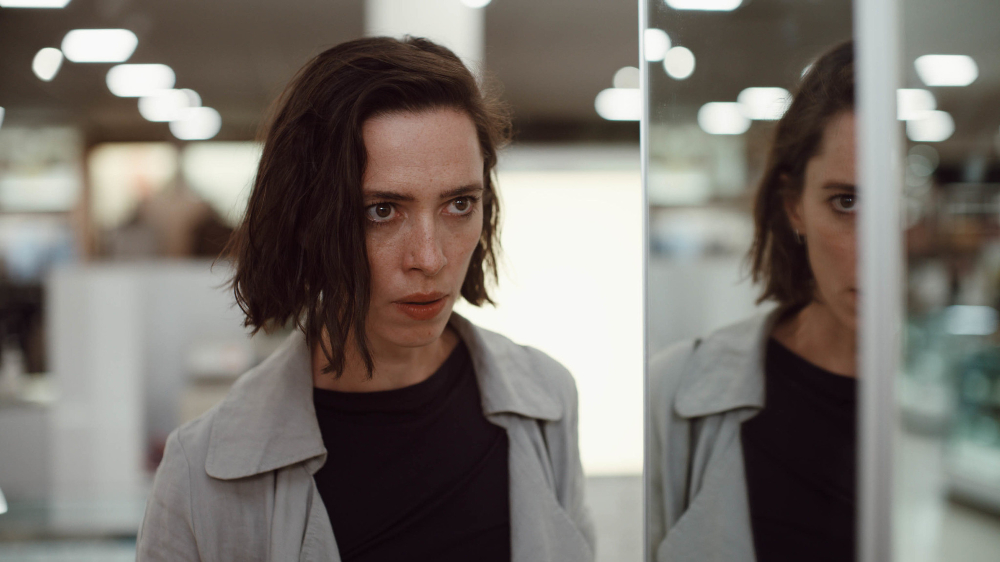
A good murder mystery asks the question of “who done it?” but the psychological version of a whodunit asks whether “it” was done at all. Resurrection isn’t a murder mystery at all, but it is one of those movies where you’re not quite sure whether the protagonist is suffering from some kind of mental illness or not, or if their memory is to be trusted.
Though confusingly marketed as a horror film, Resurrection is more of a thriller where the tension is built around its lead character’s potential descent into madness. But “descent” and “madness” are really the only paths for these films to follow and, unless rescued by an original conceit or a clever twist, inevitably into that path they will flounder. Such is the fate of this frustratingly empty picture, a maddening result that wastes a spectacular turn from its lead actress and severely limits the film’s commercial potential. This acquisition title won’t fetch nearly the same attention that Hall’s recent thriller The Night House did, as Resurrection will appear to few besides the most committed genre fans.
Resurrection is writer-director Andrew Seamans’ second feature following his 2012 indie debut Nancy, Please, and he seems to have gotten rusty around the edges in the decade since. His latest stars the formidable Hall as Margaret, who is seemingly in control of everything and everyone in her life, from a demanding job to her nearly-adult daughter (Grace Kaufman). Margaret is calculating, detached, and very much in charge. She is able to blithely summon her married lover (Michael Esper), for a horny tryst in an office bathroom, and to just as easily dismiss him when his performance is not up to her standards. She exercises regularly, maintains a meticulous, modern apartment, and does not bristle at telling her young intern, Gwyn (Angela Wong), how and why she needs to detach from the abusive man in her life. All is under control.
That is, however, until a mysterious man named David (Tim Roth) seems to make an unwelcome appearance. At that point, Margaret’s grip on her life — and perhaps even on reality itself — begins to quickly loosen. Telling you much more about the enigmatic David would ruin some of the script’s few surprising moments, moments I won’t dare dilute given the precious few that are original in Resurrection. Suffice to say that Margaret and David had a shared experience a long time ago and that connection still haunts Margaret all these years later.

Resurrection’s below-the-line ambitions are modest and unassuming. Careful editing by Ron Dulin ratchets up the suspense at key moments, and impossibly well-lit, sanatorium-style lighting by Wyatt Garfield purposefully drives you mad, though there is nuance to be found in the shadow and darkness. The film’s best-rendered moment, in fact, is a blend of above and below-the-line contributions, as there’s a critical monologue in which Margaret explains the truth about David to the hapless Gwyn. At that moment, Hall’s acting prowess is on full display and the inkling of brilliance in Seamans’ script comes to the surface as the camera moves in close on Margaret, who’s bathed in just enough shadowy light before the film cuts to Gwyn at the perfect moment. The sequence is a series of choices all working in perfect tandem to produce a moment of cinematic greatness.
But a moment is not enough, and Resurrection’s remaining runtime is uninspired. The problem with movies of this sort, where like Steven Soderbergh‘s Unsane, you’re forced to question whether the protagonist is going mad or not, is that you pretty much know exactly where the story is headed. David — and her own demons — will drive Margaret deeper into madness and she’ll inevitably push or scare away her only lifelines (in this case, her daughter and lover). Once you figure out the outright bizarre crux of the tension between Margaret and David, it’s so bizarre that it becomes borderline laughable and not in a good way. The film’s title isn’t as clever as it thinks it is, but it makes more sense as the story unfolds.
This film’s thematic emptiness is truly a pity, given the otherwise magnificent performance by Rebecca Hall, who commands every scene while also being quite vulnerable at times. The wacky hair by department head Stefanie Terzo goes a long way in giving Margaret the unhinged look she demands, but it is ultimately Hall who does most of the work with her determined, wide-eyed gaze, her confident gait, and her emphatic deliveries. The performance is even spine-chilling at times while simultaneously being inherently sympathetic. In fact, traces of a theme begin to emerge thanks to Hall, including the power (and sometimes lunacy) of motherhood, though this film’s most interesting ideas are ultimately stillborn because the script is more interested in the grotesque than the thematic.
Resurrection will surely be described as “twisted,” “enervating,” or “wacky,” which is probably as its creator intended. But crazy for crazy’s sake feeds nothing but passing morbidity. The best psychological thrillers (must I refer to The Shining?) offer either a clever and terrifying twist or a powerful underlying motif, or both. Resurrection, with its pulpy and uninteresting denouement and the half-baked moral of its story, offers neither.
Grade: C+
Resurrection is an acquisition title at the 2022 Sundance Film Festival.





